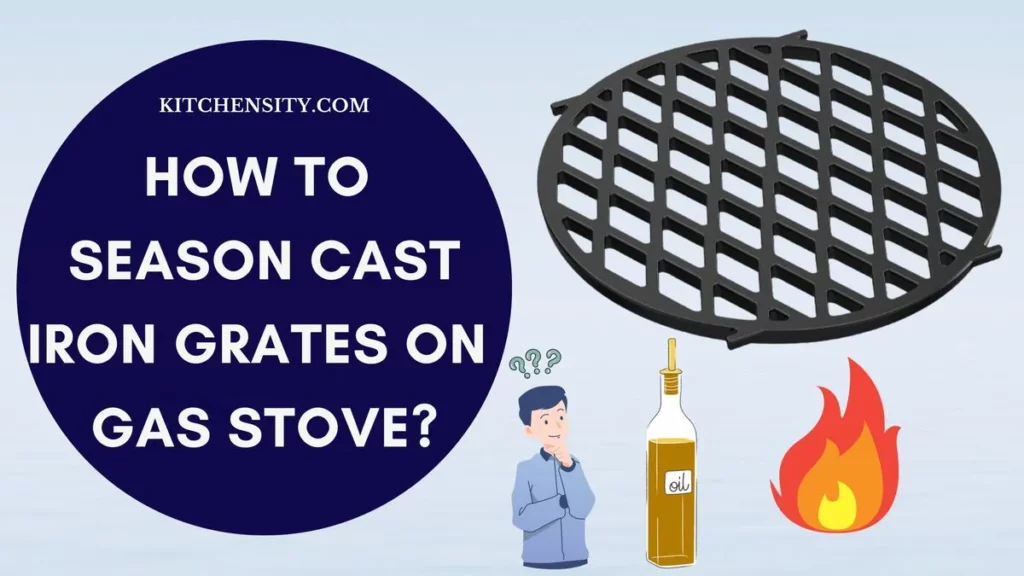Ever wondered why some meals have that irresistible, mouthwatering flavor that you just can’t replicate? The answer might lie in your stove grates.
If you’re not seasoning your cast iron grates on a gas stove, you could be missing out on a game-changing culinary secret.
Join us as we unravel the mysteries of seasoning, exploring the simple yet transformative steps that could elevate your dishes to a whole new level. Could this be the secret ingredient your cooking has been longing for? Let’s find out.
Table of Contents
- 1 How To Season Cast Iron Grates On Gas Stove?
- 2 Should You Season Cast Iron Grates?
- 3 What Temperature Do You Season Cast Iron Grates?
- 4 What Is The Best Oil To Season Cast Iron Grates?
- 5 Can You Season Cast Iron Grates With Olive Oil?
- 6 Why Seasoning Of Cast Iron Grates Are Important?
- 7 How Do You Stop Gas Stove Grates From Rusting?
- 8 Maintaining Your Seasoned Cast Iron Grates: Tips For Longevity
- 9 Final Thoughts: How To Season Cast Iron Grates On Gas Stove?
- 10 Frequently Asked Questions (FAQs)
How To Season Cast Iron Grates On Gas Stove?
To season cast iron grates on a gas stove, start by cleaning the grates thoroughly, drying them completely, and then applying a thin layer of high-smoke point oil all over the grates. Heat the grates gradually on the gas stove for about an hour, allowing the oil to bond with the metal. Let the grates cool down, and repeat the process if needed for a smooth, glossy finish.

Also Read – Why Is Cast Iron Pan Sticky After Seasoning?
Below are the step-by-step instructions for seasoning cast iron grates on a gas stove.
Materials Required
- Cast Iron Grates: Ensure they are clean and free from any debris.
- High-Smoke Point Oil: Choose oils like vegetable oil, flaxseed oil, or canola oil.
- Paper Towels: For applying and spreading the oil evenly.
- Clean Cloth: To wipe off excess oil and ensure a thin, even layer.
- Warm Water: For cleaning the grates before seasoning.
- Brush: A gentle brush to remove debris without damaging the grates.
Also Read – Seasoned Vs Unseasoned Cast Iron Skillet
Steps To Season Cast Iron Grates On A Gas Stove
- Step 1: Cleaning The Grates: Start by cleaning the cast iron grates thoroughly. Use warm water and a gentle brush to remove any dirt, grime, or leftover food particles. Avoid using soap, as it can strip away the existing seasoning. Ensure the grates are completely clean before proceeding to the next step.
- Step 2: Drying The Grates: After cleaning, it’s crucial to dry the grates completely. Use a clean cloth or paper towels to pat them dry. Ensuring they are moisture-free prevents rust formation during the seasoning process.
- Step 3: Applying Oil: Pour a small amount of high-smoke point oil onto the grates. Use a paper towel to spread the oil evenly across the surface of the grates. Make sure to coat every inch of the grates, including the corners and edges. The layer of oil should be thin and uniform.
- Step 4: Heating The Grates: Place the oiled cast iron grates on the gas stove burners. Turn on the burners to a medium-low heat setting. Let the grates heat gradually. The heat helps the oil to penetrate the pores of the cast iron, creating the coveted non-stick surface. Allow the grates to heat for about an hour, ensuring the entire surface is heated evenly.
- Step 5: Cooling Down And Repeat The Process: After heating, turn off the gas stove and let the cast iron grates cool down naturally. Check the grates for any patchiness in the seasoning. If you notice uneven spots, repeat the oil application and heating process until you achieve a smooth, glossy finish across the entire surface.
Also Read – Do You Need To Season Enameled Cast Iron?
Should You Season Cast Iron Grates?
Yes, seasoning cast iron grates is highly recommended. Seasoning not only imparts a natural non-stick surface to the grates but also acts as a protective layer, preventing rust and enhancing the overall longevity of your cast iron grates.
When properly seasoned, the grates become easier to clean, maintain, and use for various cooking purposes. Seasoning also helps in improving the flavor of the dishes you cook, as the seasoned surface adds a unique depth to the food.
Therefore, seasoning your cast iron stove grates is a valuable practice that enhances both the performance and lifespan of your cooking equipment.
Also Read – How To Season And Clean Cast Iron Cookware?
What Temperature Do You Season Cast Iron Grates?
To season cast iron grates, it’s essential to use a high enough temperature to ensure the oil bonds effectively with the metal, creating a durable non-stick surface. Generally, the ideal temperature for seasoning cast iron grates is around 375 to 400 degrees Fahrenheit (190 to 204 degrees Celsius). This moderate heat allows the oil to polymerize, forming a protective layer on the grates.
It’s important to note that the specific temperature may vary slightly based on the type of oil you’re using and the manufacturer’s recommendations. Always refer to the instructions provided by the manufacturer of your cast iron grates for the most accurate and safe seasoning process.
Also Read – Can You Re-Enamel Le Creuset Cookware?
What Is The Best Oil To Season Cast Iron Grates?
Choosing the right oil for seasoning cast iron grates is crucial to achieve a durable, non-stick surface.
The best oil for cast iron grates is avocado oil. It has a high smoke point of 520 degrees Fahrenheit, so it can withstand the high heat of grilling without burning or smoking. Avocado oil is also relatively neutral in flavor, so it won’t alter the taste of your food.
Oils with high smoke points and a neutral flavor profile are ideal for seasoning cast iron grates. Here are some other oils to consider:
- Vegetable Oil: Vegetable oil is a popular choice for seasoning cast iron grates due to its high smoke point, which is typically around 400°F to 450°F (204°C to 232°C). It forms a solid and smooth seasoning layer when heated, providing excellent non-stick properties.
- Canola Oil: Canola oil is another excellent option with a high smoke point, usually around 400°F (204°C). It creates a durable seasoning layer that helps prevent rust and enhances the grates’ non-stick capabilities.
- Flaxseed Oil: Flaxseed oil is known for its ability to create a hard, glossy, and long-lasting seasoning on cast iron surfaces. It has a relatively low smoke point, so the seasoning process involves multiple thin coats and careful heat control. Once properly cured, flaxseed oil seasoning can be exceptionally resilient.
- Grapeseed Oil: Grapeseed oil has a high smoke point, typically around 420°F to 450°F (216°C to 232°C). It forms a sturdy and effective seasoning layer, making it a suitable choice for cast iron grates.
- Sunflower Oil: Sunflower oil has a smoke point ranging from 440°F to 450°F (227°C to 232°C). It is a stable oil that can be used for seasoning cast iron grates, providing good results in terms of non-stick properties and rust prevention.
- Soybean Oil: Soybean oil has a moderate to high smoke point, making it suitable for seasoning cast iron grates. It forms a decent seasoning layer and is widely available, making it a convenient choice for many home cooks.
When seasoning cast iron grates, the key is to apply a thin, even layer of oil and heat the grates gradually to allow the oil to polymerize and bond with the metal. It’s important to note that while these oils are commonly used for seasoning, personal preferences, and dietary considerations may influence your choice.
Also Read – How To Restore A Cast Iron Griddle?
Can You Season Cast Iron Grates With Olive Oil?
Yes, you can season cast iron grates with olive oil, but it’s important to be mindful of the type of olive oil you choose. Extra virgin olive oil has a lower smoke point compared to other oils, which means it may not withstand high temperatures well during the seasoning process.
If you prefer to use olive oil for seasoning, it’s recommended to opt for regular or light olive oil, which has higher smoke points and can tolerate the heat better. Alternatively, you can mix olive oil with another oil that has a higher smoke point, such as vegetable oil or canola oil, to raise the overall smoke point and ensure a successful seasoning process. Always apply the oil in a thin, even layer to the cast iron grates for the best results.
Also Read – Can You Use Olive Oil To Season Cast Iron Pans?
Why Seasoning Of Cast Iron Grates Are Important?
Seasoning cast iron grates is crucial for several reasons:
- Non-Stick Surface: Seasoning creates a natural non-stick surface on the grates, making it easier to cook various foods without them sticking, tearing, or burning.
- Rust Prevention: Cast iron is susceptible to rust when exposed to moisture. Seasoning forms a protective layer that acts as a barrier against rust, prolonging the life of the grates.
- Enhanced Flavors: A well-seasoned surface enhances the flavors of the dishes you cook. The seasoned layer adds depth and richness, making your meals more delicious.
- Improved Durability: Seasoning strengthens the cast iron, making it more durable and resistant to wear and tear. Properly seasoned grates can last for generations with the right care.
- Easy Maintenance: Seasoned grates are easier to clean. The non-stick surface allows food residues to be wiped off effortlessly, reducing the time and effort required for maintenance.
- Uniform Heating: Seasoning helps in distributing heat evenly across the grates. This uniform heating ensures consistent cooking results and prevents hot spots.
Also Read – How To Clean A Cast Iron BBQ Griddle?
How Do You Stop Gas Stove Grates From Rusting?
Preventing gas stove grates from rusting involves regular maintenance and proper care. Here are some effective methods to stop gas stove grates from rusting:
- Seasoning The Grates: Seasoning not only enhances the non-stick properties of the grates but also acts as a protective layer against rust. Follow the seasoning process using high-smoke point oil to create a barrier that prevents moisture from reaching the metal surface.
- Drying Thoroughly: After cleaning the grates, make sure they are completely dry before placing them back on the stove. Use a clean cloth or paper towels to pat them dry, removing all moisture to prevent rust formation.
- Avoiding Harsh Cleaners: Refrain from using harsh detergents or abrasive cleaners on the grates. These chemicals can strip away the seasoning and expose the metal to moisture, leading to rust. Instead, opt for mild dish soap and warm water for cleaning.
- Immediate Cleaning: Clean the grates promptly after each use to remove any food residue, grease, or spills. Use a gentle brush and warm, soapy water to clean the grates, ensuring there are no leftover particles that could lead to rusting.
- Proper Storage: If you need to store the grates for an extended period, ensure they are completely dry and store them in a dry place. Consider placing a moisture-absorbing packet or a piece of chalk in the storage area to absorb any excess moisture.
- Regular Inspection: Periodically check the grates for signs of wear, chipping, or rust. Address any issues promptly to prevent further deterioration.
- Use Burner Caps: If your gas stove has burner caps, ensure they are in place. Burner caps protect the grates from direct contact with flames and spills, reducing the risk of rusting.
- Re-Seasoning When Necessary: If you notice signs of rust or uneven seasoning, it’s essential to re-season the grates. Follow the seasoning process to restore the protective layer and prevent further rusting.
Also Read – Why Do Cast Iron Pans Crack?
Maintaining Your Seasoned Cast Iron Grates: Tips For Longevity
Maintaining your seasoned stove grates is crucial for ensuring their longevity and optimal performance. Here are some valuable tips to preserve the seasoning and keep your grates in excellent condition:
- Gentle Cleaning: When cleaning your seasoned stove grates, avoid harsh detergents, abrasive brushes, or scouring pads. Opt for mild dish soap, warm water, and a soft sponge or cloth. Gently remove any food residue or grease without scrubbing off the seasoning layer.
- Avoid Soaking: Refrain from soaking the seasoned grates in water for extended periods. Prolonged exposure to moisture can lead to rust formation and weaken the seasoning. Clean the grates promptly after use and dry them thoroughly to prevent moisture damage.
- Use Wooden Or Silicone Utensils: When cooking on your seasoned grates, use wooden or silicone utensils instead of metal ones. Metal utensils can scratch the surface and damage the seasoning. Wooden or silicone tools are gentle on the grates and help maintain the non-stick properties.
- Regular Seasoning Maintenance: Periodically check the condition of the seasoning on your grates. If you notice any patchiness or dull spots, it’s time to re-season. Follow the seasoning process to restore the protective layer and maintain the grates’ non-stick surface.
- Proper Storage: If you need to store the grates, ensure they are completely dry before storing them. Store them in a cool, dry place to prevent moisture accumulation. Consider placing a cloth between stacked grates to allow air circulation and prevent direct contact.
- Avoid High Heat Cooking Oils: While seasoning, use oils with high smoke points such as vegetable oil, canola oil, or flaxseed oil. These oils withstand high temperatures, creating a durable seasoning layer. Avoid using low-smoke point oils like olive oil, as they can burn off quickly and leave the grates unprotected.
- Regular Inspection: Periodically inspect your seasoned grates for any signs of wear, chipping, or rust. Address any issues promptly to prevent further damage. Regular maintenance and timely repairs can significantly extend the life of your grates.
- Re-Seasoning As Needed: If the seasoning becomes compromised or wears off over time, don’t hesitate to re-season your grates. Proper re-seasoning restores the non-stick properties and protects the metal from rust and corrosion.
By following these maintenance tips, you can prolong the life of your seasoned stove grates, ensuring they remain efficient, easy to clean, and a joy to cook with for years to come.
Also Read – How To Clean A Cast Iron Grill Pan?
Final Thoughts: How To Season Cast Iron Grates On Gas Stove?
In wrapping up, seasoning your cast iron grates on a gas stove is like adding a secret ingredient to your cooking adventures. It’s not just about preventing rust or creating a non-stick surface; it’s about infusing every meal with a touch of culinary magic.
By following the easy steps outlined here, you’re not just maintaining your grates; you’re enhancing your entire cooking experience. The process might seem simple, but its impact is profound. Your grates become more than just kitchen tools; they turn into the canvas upon which you create flavorful wonders.
So, whether you’re preparing a family dinner or experimenting with new recipes, your well-seasoned grates will be there, turning ordinary meals into extraordinary delights. Happy cooking, and enjoy the flavorful journey your seasoned grates will take you on!
Also Read – Is It Safe To Cook In A Rusty Cast Iron Pan?
Frequently Asked Questions (FAQs)
-
How Often Should I Season My Cast Iron Grates?
Season your grates whenever they appear dull or lose their non-stick properties, typically every few months with regular use.
-
Can I Use Olive Oil For Seasoning?
While olive oil has a lower smoke point, it can be used for seasoning. However, oils with higher smoke points like vegetable or flaxseed oil are recommended for optimal results.
-
Can I Speed Up The Seasoning Process?
Patience is key in seasoning cast iron grates. Rushing the process may lead to uneven seasoning, affecting the cooking surface.
-
How Do I Remove Rust From My Cast Iron Grates?
To remove rust, scrub the affected area with steel wool or a brush, then re-season the grates following the steps mentioned in the article.
-
Can I Season Cast Iron Grates In The Oven?
Yes, seasoning can be done in the oven. Place the grates upside down on the oven rack, with a foil-lined tray beneath to catch any drips, and follow the same steps as heating on a gas stove.
Katrina Smith is a seasoned expert with over 25 years of experience in all things related to cooking and the kitchen. As an avid cook and kitchen enthusiast, she is passionate about sharing her knowledge and expertise on cookware, kitchen appliances, kitchen tips, and kitchen staples.
Through her articles and reviews, Katrina aims to inspire and help others improve their cooking skills, experiment with different ingredients, and invest in quality cookware and appliances.

![How To Season And Clean Cast Iron Cookware? [4 Effective Ways] 3 How To Season And Clean Cast Iron Cookware](https://www.kitchensity.com/wp-content/uploads/2020/06/How-To-Season-And-Clean-Cast-Iron-Cookware.jpg)




